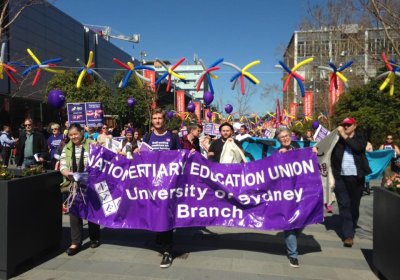Communist and feminist Zelda D’Aprano became the symbol of the fight for equal pay when, in October 1969, she chained herself to the Commonwealth Offices in Melbourne, after becoming frustrated at the lack of pay equity for women.
D’Aprano was employed by the meatworkers union, which was involved in a test case on the gender pay gap in the meat industry before the Commonwealth Conciliation and Arbitration Commission. At the time, women’s participation in the workforce was 38% and they were paid 75% of men’s wages for doing the same work.











